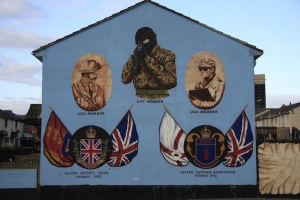The following post was written by Global Gap Year Fellow David Gonzalez Chavez.
Trigger warning: If you are sensitive to discussions of suicide or violence, please be advised.
I’ve spent the majority of the time thus far on my gap year in Belfast, Northern Ireland volunteering for an organization called Quaker Cottage (which I’ll refer to as Quakers, the way in which everyone who we work with refers to us). Quakers is a family intervention program which takes mothers and their families who have been referred to us by social services or by themselves for various issues, and they’re provided a safe space in which to discuss anything while the childcare team (which I’m a part of) takes care of their babies or hosts after-school groups for all other ages of children. An important part of the program is that it brings an even split of Protestant and Catholic families, serving to also bridge this divide that exists by showing these families that they have much more in common with each other than they previously thought.
There are various reasons for why a mum might end up at Quakers, and these highlight why Quaker Cottage is extremely valuable to the community. Many of the issues that the mums face are all cyclical in nature, including poverty, teenage pregnancy, having too many children, abuse in many forms, and mental health issues. These issues are the same that faced their parents and grandparents most of the time, and the mums are overwhelmed by these cycles and struggle to break free to give their children a better experience.
Despite having the strong welfare state that comes with being a part of the United Kingdom, North and West Belfast have extreme issues with understaffing of all medical staff (in particular any relating to mental health), homelessness, neglect, and general poverty. Many of these issues are unable to be resolved because of consistent political gridlock in the region, most notably with the regional legislature for Northern Ireland and thus the regional government itself being inactive for over 900 days, up to about 50 days ago. Without a body to update legislation and react to changing issues in the region, many issues were left to fester, particularly those surrounding mental health.

somewhat popular place for people to take their lives. It overlooks North and West Belfast,
making it a somber reminder of the terrible mental health crisis there.
In addition, these cycles are bolstered by the relative ease with which students are able to leave schooling early or simply not attend schools. Truancy is a major issue in the city, preventing children from achieving a solid education and thus later forcing them into either low-wage job markets or oftentimes simply not working at all. One girl I work with is only 12, yet hasn’t attended school for more than 2 years; it’s difficult to see much of a future for a child like her, for whom the educational system has utterly failed and allowed her to slip through the cracks. The political gridlock is partially to blame for not implementing more comprehensive legislation to afford a consistent and strong education to all, but so is the mental health crisis leading to mums unable to enforce boundaries with their children and thus allowing them to skip school without issue.
The second most common set of reasons why a mum might come to Quakers all relate to the intense sectarianism in Belfast. Tensions still run hot in the city between Protestants and Catholics, and paramilitaries on both sides remain present and continue to terrorize the common people. Many mums have experienced violence or aggression of some form from the paramilitaries, or some might themselves have connections to them; though these might not be the direct reasons for them coming to Quakers, they certainly influence why they might find themselves in repeated cycles of poverty, abuse, and more. The paramilitaries create hostility and stagnation wherever they operate, preventing progress and maintaining the status quo. From my perspective, these paramilitaries exist only because of each other; the existence of one side’s paramilitaries justify the existence of the other side’s, and as such, they rely on each other. The fear that comes with knowing about other paramilitaries makes people willing to deal with the negatives of those of their community, ignoring the fact that without one there might not be the other.

paramilitaries from one of the neighborhoods where our mums live. (Source)
Personally, I believe that I’m valuable as a volunteer because of the nature of many of these mums’ issues and those of the community at large. The most obvious reason is that I’m entirely an outsider, which means that in no way could I have any stake in the sectarian conflict of Belfast. When people interact with me, they know immediately that I don’t care if they’re Protestant or Catholic, and so they’re able to drop their guard and in doing so feel more comfortable at Quakers. The second reason is that many of the issues in the mums’ lives can be directly attributed to men, typically their partners or former partners; thus, having a reliable and kind man (myself) working with their babies and children not only demonstrates to them that men do have the capacity to be better, but also provides a stable male role model to their children, which most of them sadly lack.
While Quakers and myself cannot solve any of the deep-rooted issues in the lives of the mums, we can be there to support them to hopefully break of the various cycles that continue to harm them and their families. We show them that they and their families have immense value, and that they can at times put their guard down and be loved and supported by others.
